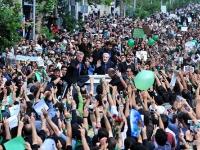BOB GARFIELD: From WNYC in New York, this is NPR's On the Media. I'm Bob Garfield.
BROOKE GLADSTONE: And I'm Brooke Gladstone. Last week, journalists who traveled to Iran in search of election stories found, instead, the biggest uprising in that country since the Revolution more than 30 years ago. Iranians poured into the streets protesting what they charged was an election rigged in favor of incumbent President Mahmoud Ahmadinejad. Supporters of the challenger, Mir-Hossein Mousavi, rallied day after day, risking prison and much worse. Mindful of all the coverage, Iranian officials arrested dissidents, refused to renew the visas of foreign journalists and, as this CNN clip suggests, clamped down hard on those who remained.
[CLIP]:
MALE CORRESPONDENT: - Iran, resisaya [2:17] permitted to file just one, just one report for all of our networks for the entire day, our crews forbidden to witness the situation firsthand. And for that reason, you’re not going to see a live report that we had planned.
[END CLIP]
BOB GARFIELD: Not only did the government try to keep the world from looking in, it also sought to keep its citizens from looking out. Babak Rahimi is a professor of Iranian and Islamic Studies at the University of California San Diego. He’s in Teheran now and says that the state has been distressingly effective in cutting off the outside world.
BABAK RAHIMI: Especially after 4 p.m., the only source of information I have – really, I mean, I'm talking about a news channel – is Iran’s state channel. And that’s kind of scary, because their version of stuff is really one-sided. CNN, BBC, all these different channels are out, including Internet – it’s just extremely slow – including telephone lines, especially when you want to call outside of Iran. But somehow, sometime around 1 a.m., when everyone’s asleep, most of these things come back on. So the feeling of isolation from afternoon onwards is just immense. I mean, literally you feel like you’re in a prison.
BOB GARFIELD: You said that state TV is one-sided. What are they having to say about the unrest?
BABAK RAHIMI: It’s literally a monologue, one voice that is telling everyone that there’s this bunch of hooligans are running around destroying things, and they're also being funded by foreign agents. So the images they're producing is that this is very much of a minority movement that is run by troublemakers, and the Iranian people in general just completely reject it, which is, of course, not true. And they're doing this on daily basis.
BOB GARFIELD: What’s your sense for the ordinary Iranian and how he or she filters the state news?
BABAK RAHIMI: I'm talking to friends and colleagues, and especially promo-savvy people, and they say, look, we just turn off TV, and at this moment, for the last six or seven days, after elections, we simply talk to each other.
BOB GARFIELD: Do Iranians know that the whole world is watching this drama with bated breath?
BABAK RAHIMI: Oh, absolutely. You know, this is, you know, 2009. I mean, most of the Iranians are getting the information from satellite TV. All these images that are coming about the protestors, actually there are many Iranians who are watching it on CNN, BBC. Voice of America and also BBC Persia have been kind of blocked, but they could still watch these things on German TV, on French TV, on satellite TV. So, you know, there is a sense that the state is trying to hamper information, but at the same time they're finding ways to find out.
BOB GARFIELD: Twitter has been at the center of the conversation. It’s unclear how much of a role Twitter has played, but we have seen a lot of press reports of Iranians using Twitter to give a kind of blow-by-blow description, but more especially those in the Diaspora keeping others apprised of events.
BABAK RAHIMI: Twitter is a recent thing in Iranian society, especially among the youngsters. My hunch is that the Diaspora community has kind of exaggerated the effect of Twitter. Definitely there are some Iranians that are using Twitter in order to connect with other Iranians outside of Iran, but at this moment I could assure you Twitter is not the main kind of new form of communication where Iranians, in which Iranians are using.
BOB GARFIELD: The government has forbidden foreign journalists from leaving their hotel rooms, and so forth, to report on the demonstrations. Now, strictly speaking, you’re not a journalist but you’re behaving in kind of a reporting capacity now. What risk are you placing yourself under to have this very conversation?
BABAK RAHIMI: My wife and I have been talking about this all week. I see myself as a researcher, as an educator and not necessarily, of course, as a reporter, but if I could have a chance to express and reflect what’s going on here on the ground to the outside world, I think I have done my job as an educator. I feel that I'm kind of safe because they would not expect someone like me giving out these reports. But, again, the word is getting around and, you know, you never know what’s going to happen. And I'm just hoping for the best at this moment. It’s a kind of feeling of excitement but, at the same time, anxiety is with me right now.
BOB GARFIELD: Babak, thank you so much.
BABAK RAHIMI: Thank you, absolutely.
BOB GARFIELD: Babak Rahimi is author of the book Internet and Politics in Post-Revolutionary Iran.
